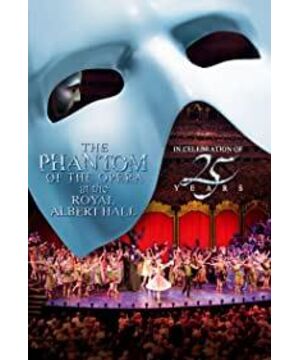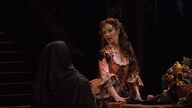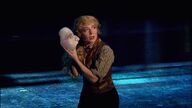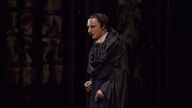On September 23, 2019, I finally watched the 25th anniversary edition of "The Phantom of the Opera" played by Mr. Bai in the "Basics of Literary Creation" class last semester. I've forgotten why he played The Phantom of the Opera, I just remembered that I was so excited for just a few minutes, the heroine was like a character from a beautiful manga. Later, on July 12th, when I heard the solo of DIVA at the Vitas "20" concert, I played a piece of music. I was so fascinated by it that I asked on Weibo that it was "The Phantom of the Opera". In short, I think I have a relationship with this musical haha~ Once I watch it, I see each other late, collecting station B, looping playlists, collecting pictures... I can read the original works of French detective novelist Gaston Leroux and watch music. The musical adaptation of drama master Andrew Lloyd Webber, under the interpretation and polishing of Sarah Brightman, Michael Crawford and other masters, can fully appreciate the full singing voice and performance of Ramin and Sierra, especially in the In the case of being unable to visit the scene in person, I can watch and admire at station B and various netizens again and again... Hypocritically speaking, I feel so blessed to be born in this era!
Since I like "The Phantom of the Opera" so much and read the novel again, I would like to share some of my discoveries and feelings.
What amazes me is that the intoxicating musical or film The Phantom of the Opera was born out of the detective novel that swept the French market in the 19th century. The reason for the surprise is that, in my opinion, musicals are beautiful, romantic, and magical, and should originate from romance novels. I haven't read much detective fiction, but it's supposed to be cool, rational, scary. Gaston Leroux (1868-1927), the author of the novel "The Phantom of the Opera", was a prolific writer, with as many as thirty or forty works well-documented. Published in 1911, "The Phantom of the Opera" is "a wonderful novel in the genre between detective novel and absurd novel, telling the story of 'human ghosts'". The novel is written in the first person of the author who is a reporter. It is a review and review of the entire "case" many years later, and contains a large number of so-called investigative materials - The Phantom of the Opera is a "case", which is related to conspiracy, human life, deception, It's about crime, not "story", about hearsay, love, fantasy, magic. This distinction determines that some are unique to musicals, while others are only told in novels.
1️⃣ Anecdotes in musicals, real events in novels
The musical began at an auction at the Paris Opera in 1905, when Count Raoul was in his old age and Christine died. In connection with the scene in the cemetery later, the birth and death years (1821-1872) on Christine's father's tombstone, and her longing for her father, it can be guessed that the main story is about the 1880s. The items auctioned are important objects in the fate of the protagonist twenty years ago, especially the little monkey music box. Raoul, who is both a bystander and a witness, seems to be slowly telling the story of his lover and the musical angel.
The title of the chapter at the beginning of the novel is "The author of this strange book tells how he went through a follow-up investigation and was finally convinced that the Ghost of the Opera House really exists", and the first sentence is "The Ghost of the Opera House does exist". In order to emphasize that the ghost is a living human being and to show that the events are objectively real, the author makes the narrator a bystander, an investigator in the early twentieth century, citing a series of evidences, such as the successor manager Mon Salman's "A Theater Manager" "Memories", archives, newspapers, letters from the parties, the numbered investigative notes of the Sergeant Miffy's questioning of the Viscount Raoul de Chaney, the accounts of the Persians... In short, this novel is like a forensic report. , in order to find out the truth.
What the musical is trying to create is exactly what the novel tries to make clear. The musical mainly tells about a sad memory, with the passion of music and love, but also the painful feelings of admiration, arrogance, jealousy, inferiority, deceit, threat and so on. Although there are many characters involved in this past, the core will always be the three-person relationship between Christine, Phantom and Raoul, which is also the focus of the musical adaptation. It is immersive and feels the situation of the people in the play. However, the novel interrupts the mystical fantasy of the story itself time and time again with a variety of bystander viewpoints and external data. From the title to the character introduction, strive to be clear and detailed. Under the objective and organized, the mystery is peeled off layer by layer, and the climax of the story is the revelation of the case.
The musical is magical and romantic, it seems to provide the possibility of love that transcends secular prejudice, and has a certain role in thinking about reality. At the same time, music, an art form that can affect people's mind and body, allows the audience to experience the magic of the Phantom. In this way, we can have more sympathy, understanding and even respect for Christine and the Phantom. In the detective novel, the reason for the case is the genius and cunning of the Phantom, the innocence of the actress (she grew up in an atmosphere of myth and superstition, and this moral foundation gives people an opportunity), and Raoul's kindness and bravery. A wicked love affair that is addicted to music turns into a kidnapping and fraud case of a genius lunatic. The Phantom brings terror, ugliness, and death. And Christine, like the classic "damsel-in-distress", arouses readers' anxiety, sympathy, regret and other emotions.
But both the fantasy of a musical and the truth of a detective story are a lot of fun. After all, novels have more capacity and richer details than musicals. In the novel, the high-altitude set frame like a forest in the sky, the bottomless huge underground labyrinth of the Opera House, the rotating shaft mirror with a counterweight, the hidden passage in the Paris Commune period hidden in the wall, the Persians and Raoul almost died by six. The torture chamber of heated mirrors (and the illusions they form), and at the end the narrator reminds the reader to look closely at the walls and columns of the Paris Opera... They liven up the fantasy of the musical and make the novel more real, Even bring this fantasy of authenticity into reality.
2️⃣ The mysterious Phantom in the musical, Eric in the novel
The beauty and ugliness of The Phantom is the most direct difference between musicals and novels. In musicals, we are familiar with tall and charming rice buckets, half of the face is no different from ordinary people (even a little handsome), and the other half is hidden under a white mask. He was of a certain age, because under the mask was sparse white hair. His voice is like a bell when he is angry, and he is gentle and low when facing Christine, especially The Music of the Night. From Mrs. Gili, we only know that he is from a circus, a musical genius, a magician, an architect... but an ugly face and a adept at using the deadly Punjabi rope. According to his own confession, he was born with this face, and his mother didn't want to kiss him, but just gave him a cold mask.
The rice bucket on the stage must be tall and handsome. Lessing said in Laocoon that the first principle of visual art is beauty, only poetry can write ugliness, write howl, and write personality in a moving way. The image of the Phantom in the novel is indeed extremely ugly and terrible. According to the description of the setter Joseph Bouquet at the beginning of the novel:
"He was so skinny, and the black clothes that hung over the frame of bones were floating. The eyes were so deep that it was difficult to see the eyeballs that were still. In short, only two like the skulls of the dead could be seen. A big black hole. The skin of the bone is like a taut drum skin, the color is not pale, but an ugly and scary sallow; the nose is so insignificant that you can't even make out the outline, and the face without the nose looks very scary Three or four long brown locks hang down from the forehead and behind the ears.” (3-4)
The Phantom lowers the chandelier in the musical, inflicting numerous casualties, strangling Boogie and Piangie. The same is true in the novel, but without the character of Pianghi, the chandelier kills the ushers, Mrs. Gilly's replacement. The Phantom in the novel has a more three-dimensional character. For example, he will tip Mrs. Geely who "led" him to Box 5. Geely returns the fan left by the Phantom's girlfriend, and he will give Mrs. Geely a box of her favorite English candy ( But who the female companion is is still a mystery). Coupled with his nice voice, Mrs. Gilly thought Phantom was gentle, lovely and likable. He has a strong possessiveness, is good at understanding and exploiting people's psychology, he kidnapped Christine to the underground lakeside residence, let her see his real life, aroused the sympathy of the kind girl, and wanted to make her come to the next time. . But when forcing Christine to marry, Phantom is a real terrorist and anti-social personality. He prepared enough gunpowder to blow up a quarter of Paris. Christine agreed to marry, and the underground lake would flood the explosives, otherwise Everyone must be buried with the Phantom. This is not a question of sacrificing a Raoul out of love's jealousy and inferiority.
Phantom's image and character are different, of course, there are requirements for art form and adaptation, and there are also reasons for emphasizing fantasy or reality as mentioned earlier. In the musical, the Phantom has no name and has a brief history, while in the novel, we learn about the life of poor and unfortunate Eric through the narration of the last Persian, there are also two art forms that appeal to emotion and experience, and v. Literary and rational reasons. We only know in the novel that Eric is called "a man who likes to fiddle with trapdoors". With superhuman talent and extraordinary imagination, he tries his best to exploit human beings, and he does things boldly and without any scruples. He ran away from home at an early age, and his circus experience taught him singing and magic. This was followed by "the good times of Mazandaran" in Persia, where he built a magic palace for the king, but rulers tended to kill such skilled craftsmen. The Persians rescued him, and Eric came to the Sultan and left for similar reasons. Finally, he participated in the construction of the Paris Opera House, and there is now the story. He knows ventriloquism, which is why ghost voices can be heard everywhere. Eric and Christine's unusually close and trusting relationship was what she told him when she exchanged heartfelt feelings with Raoul on the roof of the Opera House.
The name Eric, and "poor unfortunate Eric" to which Kristin laments, makes the Phantom a living person whose motives, pain, and wickedness arouse our moral sensibilities as well as artistic ones. How terrified and disturbed and disgusted we are, how moved and saddened by Eric's final statement that he let Christine and Raoul go, and how he kissed and cried with Christine. Although the phantom in the musical also has a tragic life experience, his namelessness, elegant image, final disappearance, and finally Christine's sympathy and redemption turn mysterious events into myths and achieve music in true aesthetics. Angel. Sympathy and other human topics have been seen frequently in novels, and the novel discusses other social topics.
3️⃣ Conciseness in the musical, the life experience of father, Raoul, Christine, Persian in the novel
Musicals require extensive cuts from the novel. If we are careful, we can know that Christine's father is a violinist, a little famous in the music industry. Raoul knew Christine as a child, and they used to listen to mysterious fairy tales together at night. There is no Persian at all in the musical, and the person who reveals the Phantom's origins and guides Raoul into the lakeside residence is Mrs. Gilly. She is a bit like a combination of Snape and Professor McGonagall in the musical, majestic, dignified and elegant, but also mysterious. But in the novel, she is only a usher, and she has not undertaken many other plot tasks except for being familiar with Box 5 and skillfully handing the Phantom a monthly salary of 20,000 francs.
But what's not omitted from the musical is Christine's relationship with her father. She loves and misses her father, as the song Wishing You Were Somehow Here Again sings in the cemetery scene can illustrate. After her father's death, she regarded the musical angel in her father's story as a spiritual sustenance and an object of attachment. In the novel, this is the opportunity for the deception to unfold, and the musical makes people feel the Phantom's protection of her, the growth of a girl, and the complex and twisted relationship between them. It seems that the love in art and the love in the real society cannot be simply compared together. The same is true of people's "ghost" love, teacher-student love, and domineering president falling in love with me. Romance for the imagination to gallop must not be placed in life as it is.
In the novel, the narration about the old Dae is placed in the follow-up introduction of the narrator in the sixth chapter. The old Dae is the most outstanding country violinist in Scandinavia. The singing of the father and daughter was appreciated by Professor Valerius and his wife, and Christine received formal music education and training. When the father and daughter returned to their hometown to sing, they met a little boy named Raoul and his housekeeper. Kristin and Raoul met again three years later, but they both knew it was impossible to get married because of their identities. After the death of old Dae, Christine's wonderful singing voice is no longer, until she is a blockbuster with the help of Phantom.
In the musical we only know Raoul as a viscount. In the novel, his mother died because of his dystocia. Raoul was raised by his elder brother, Count Philip, loved by two sisters and an old aunt, and was educated entirely by women. Therefore, his character was very innocent and kind, and he was long-lasting. To be as pretty as a girl. However, he is a navigator, a seaman's school graduate, has completed a global voyage, and is about to be tasked with searching for missing ships in the polar ice seas in six months. Raoul in the play is quite manly, strategized, sophisticated and clever, and uncovers conspiracies. But he has the most wonderful character matching in the novel. Facing his lover, high-altitude set, and underground torture chamber, he seems to be weak and easily feels pain. And when it comes to chasing after his lover, solving mysteries, and following the Persians to explore underground, he is very brave, desperate, and even reckless and impulsive.
The Persian Daloga's account of the ghost of the opera house and the evidence provided are the key to finally convincing the narrator of all stories. The unknown experience of the Phantom, the climax of the case or the story, the secret of the Opera House, the secret door, the lakeside residence, the "Styx", the mirror, the torture chamber, the Punjabi rope, are all revealed by the Persians. He wears a grey round hat and is a Persian official. He had to leave Persia and come to Paris because he had secretly rescued Eric. He is the invisible narrator of the novel.
The backgrounds of these characters are added as stories within stories, evidence within evidence. From time to space, they have expanded the situation of The Phantom of the Opera - the life of the characters is mixed with the change of political period and geographical environment, making the case more distant for people's imagination.
?
The Phantom of the Opera fascinates and lingers, thanks to the borderless language of art and the enduring human themes of love and prejudice. The original detective novel has added enough real details, the suspense of the dangers, and the content of the very exciting "big title" nature:
Needless to say, the case was a sensation in Paris. The female singer was kidnapped, Count Philip died unexpectedly, and the three lighting engineers of the opera house were unconscious for no reason! ...the terrible things continue! Too much suspense haunts the hearts of the capital's residents! A horrific crime ensues around the love story between Raoul and the tender and charming Christine! ... After the mysterious female singer of the moment disappeared, what was her fate? ... (319)
If there was only one reason I could choose to explain the magic of this story, it would be "sympathy." Combining extreme talent and extreme evil, the most beautiful appearance and the most tragic fate, Gaston Leroux combines ancient sympathy with the hidden psychology of fear, pity, beauty, love, and even abuse, attachment, and the Stockholm effect. Combined to form this complex creation, poor unfortunate Eric, the immortal Phantom!
Finally, I would like to excerpt a description of Eric's singing:
"It always combines the highest and lowest notes seamlessly: wide range, majestic timbre, high-pitched and euphemistic, passionate and delicate, delicate and passionate, irresistible and admirable. This singing is based on the strengths of many families; Every ordinary person who likes music, has understanding and expressive ability to music, will naturally learn this elegant note as soon as he hears this song. This is a source of calm and pure music, and believers can drink boldly, some of them from it Absorbed the true meaning of music. As soon as their singing art was enlightened by God, a great change took place immediately.” (116)
?[French] Gaston Leroux: The Phantom of the Opera, translated by Fu Jinyong, Shanghai: Shanghai Translation Publishing House, 2012.
View more about The Phantom of the Opera at the Royal Albert Hall reviews









